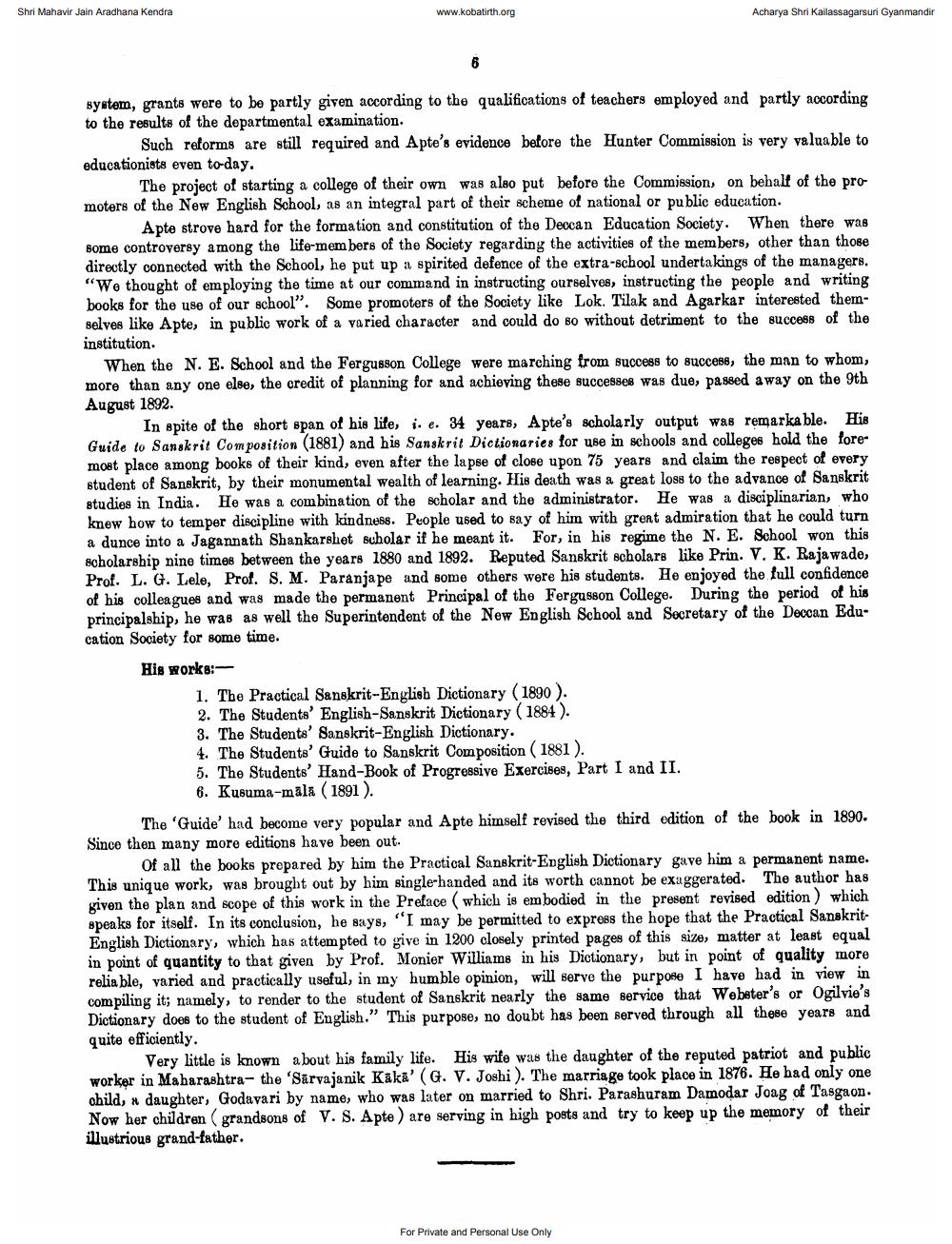________________
Shri Mahavir Jain Aradhana Kendra
www.kobatirth.org
6
system, grants were to be partly given according to the qualifications of teachers employed and partly socording to the results of the departmental examination.
Such reforms are still required and Apte's evidence before the Hunter Commission is very valuable to educationists even to-day.
The project of starting a college of their own was also put before the Commission, on behalf of the promoters of the New English School, as an integral part of their scheme of national or public education.
Apte strove hard for the formation and constitution of the Deccan Education Society. When there was some controversy among the life-members of the Society regarding the activities of the members, other than those directly connected with the School, he put up a spirited defence of the extra-school undertakings of the managers. "We thought of employing the time at our command in instructing ourselves, instructing the people and writing books for the use of our school". Some promoters of the Society like Lok. Tilak and Agarkar interested themselves like Apte, in public work of a varied character and could do so without detriment to the success of the institution.
His works:
When the N. E. School and the Fergusson College were marching from success to success, the man to whom, more than any one else, the credit of planning for and achieving these successes was due, passed away on the 9th August 1892.
Acharya Shri Kailassagarsuri Gyanmandir
In spite of the short span of his life, i. e. 34 years, Apte's scholarly output was remarkable. His Guide to Sanskrit Composition (1881) and his Sanskrit Dictionaries for use in schools and colleges hold the foremost place among books of their kind, even after the lapse of close upon 75 years and claim the respect of every student of Sanskrit, by their monumental wealth of learning. His death was a great loss to the advance of Sanskrit studies in India. He was a combination of the scholar and the administrator. He was a disciplinarian, who knew how to temper discipline with kindness. People used to say of him with great admiration that he could turn a dunce into a Jagannath Shankarshet scholar if he meant it. For, in his regime the N. E. School won this scholarship nine times between the years 1880 and 1892. Reputed Sanskrit scholars like Prin. V. K. Rajawade, Prof. L. G. Lele, Prof. S. M. Paranjape and some others were his students. He enjoyed the full confidence of his colleagues and was made the permanent Principal of the Fergusson College. During the period of his principalship, he was as well the Superintendent of the New English School and Secretary of the Deccan Education Society for some time.
1. The Practical Sanskrit-English Dictionary (1890).
2. The Students' English-Sanskrit Dictionary (1884).
3. The Students' Sanskrit-English Dictionary.
4. The Students' Guide to Sanskrit Composition (1881).
5. The Students' Hand-Book of Progressive Exercises, Part I and II.
6. Kusuma-mala (1891).
The 'Guide' had become very popular and Apte himself revised the third edition of the book in 1890. Since then many more editions have been out.
Of all the books prepared by him the Practical Sanskrit-English Dictionary gave him a permanent name. This unique work, was brought out by him single-handed and its worth cannot be exaggerated. The author has given the plan and scope of this work in the Preface (which is embodied in the present revised edition) which speaks for itself. In its conclusion, he says, "I may be permitted to express the hope that the Practical Sanskrit English Dictionary, which has attempted to give in 1200 closely printed pages of this size, matter at least equal in point of quantity to that given by Prof. Monier Williams in his Dictionary, but in point of quality more reliable, varied and practically useful, in my humble opinion, will serve the purpose I have had in view in compiling it; namely, to render to the student of Sanskrit nearly the same service that Webster's or Ogilvie's Dictionary does to the student of English." This purpose, no doubt has been served through all these years and quite efficiently.
Very little is known about his family life. His wife was the daughter of the reputed patriot and public worker in Maharashtra- the 'Sarvajanik Kaka' (G. V. Joshi ). The marriage took place in 1876. He had only one child, a daughter, Godavari by name, who was later on married to Shri. Parashuram Damodar Joag of Tasgaon. Now her children (grandsons of V. S. Apte) are serving in high posts and try to keep up the memory of their illustrious grand-father.
For Private and Personal Use Only




